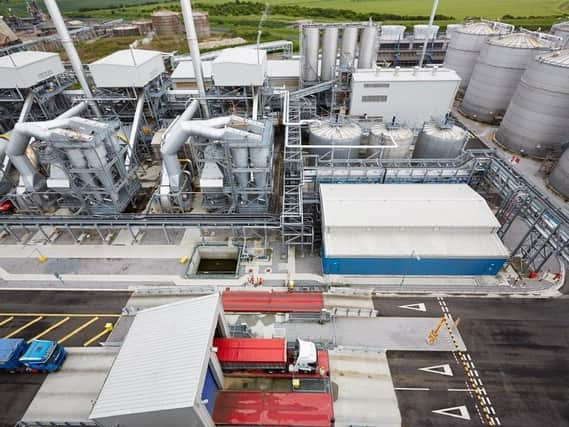Vivergo in Hull to start recruitment drive following E10 fuel decision


Business leaders and MPs have welcomed the reopening of the factory at Saltend near Hull, after a Government decision to allow the sale of a lower carbon fuel.
The move will see jobs created at AB Sugar’s Vivergo plant, which closed in late 2018, due in part to delays in decision-making on E10, which contains up to 10 per cent bioethanol.
Advertisement
Hide AdAdvertisement
Hide AdIt is now set to reopen in early 2022, with the new fuel becoming available on forecourts from September.
The factory, which opened in 2013 on the back of a £400m investment, takes locally grown animal feed wheat, mills it, brews it and then extracts bioethanol, which is then added to petrol.
Before its closure, Vivergo processed around 1.1m tonnes of wheat from around 900 farms across the North East and Yorkshire.
Dr Mark Carr, Group Chief Executive of AB Sugar, said they would start recruiting around 85 people for specialist roles in the coming weeks.
Advertisement
Hide AdAdvertisement
Hide AdHe said: “This is good news for a sustainable British biofuels industry, the economy within the Humber region, the environment and consumers.”
Humber Local Enterprise Partnership chair Stephen Parnaby said it was a “quick and easy option to lower vehicle emissions, whilst also supporting our local industry and agriculture”.
Meanwhile Beverley and Holderness MP Graham Stuart said the benefits for the environment were equivalent to about 300,000 cars being taken off our roads each year.
A protein-rich animal feed produced as a by-product also reduces the UK’s dependency on soy imports from South America.
Advertisement
Hide AdAdvertisement
Hide AdHe said: “Needless to say, this benefits the UK’s food security – not to mention the fact that it cuts transport emissions and helps prevent deforestation.”
Ministers say the introduction of E10 fuel will boost the Government’s ambitions to reach net zero carbon emissions by 2050.
Its introduction on UK roads could cut transport CO2 emissions by 750,000 tonnes per year, the equivalent of taking 350,000 cars off the road, it is claimed, the equivalent of all the cars in North Yorkshire.
However as many as 600,000 vehicles are thought not to be compatible. Older vehicles including classic cars, and some from the early 2000s, will continue to need E5 fuel.
Comment Guidelines
National World encourages reader discussion on our stories. User feedback, insights and back-and-forth exchanges add a rich layer of context to reporting. Please review our Community Guidelines before commenting.